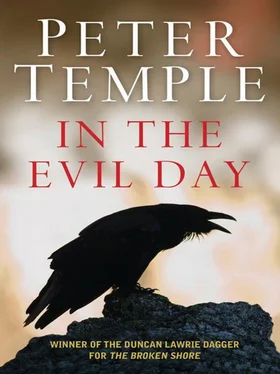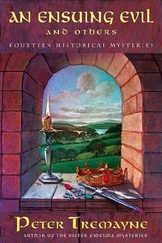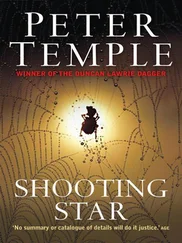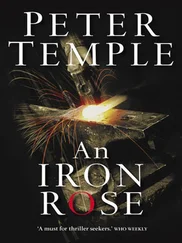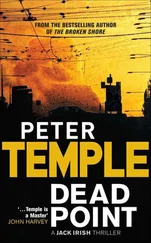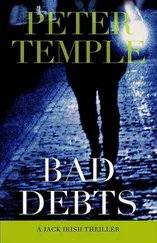Peter Temple - In the Evil Day
Здесь есть возможность читать онлайн «Peter Temple - In the Evil Day» весь текст электронной книги совершенно бесплатно (целиком полную версию без сокращений). В некоторых случаях можно слушать аудио, скачать через торрент в формате fb2 и присутствует краткое содержание. Жанр: Триллер, на английском языке. Описание произведения, (предисловие) а так же отзывы посетителей доступны на портале библиотеки ЛибКат.
- Название:In the Evil Day
- Автор:
- Жанр:
- Год:неизвестен
- ISBN:нет данных
- Рейтинг книги:5 / 5. Голосов: 1
-
Избранное:Добавить в избранное
- Отзывы:
-
Ваша оценка:
- 100
- 1
- 2
- 3
- 4
- 5
In the Evil Day: краткое содержание, описание и аннотация
Предлагаем к чтению аннотацию, описание, краткое содержание или предисловие (зависит от того, что написал сам автор книги «In the Evil Day»). Если вы не нашли необходимую информацию о книге — напишите в комментариях, мы постараемся отыскать её.
In the Evil Day — читать онлайн бесплатно полную книгу (весь текст) целиком
Ниже представлен текст книги, разбитый по страницам. Система сохранения места последней прочитанной страницы, позволяет с удобством читать онлайн бесплатно книгу «In the Evil Day», без необходимости каждый раз заново искать на чём Вы остановились. Поставьте закладку, и сможете в любой момент перейти на страницу, на которой закончили чтение.
Интервал:
Закладка:
‘This is stupid,’ said Lucas. ‘For God’s sake, we were worried, this is not a good idea, John, you’re coming to stay with us, you can’t stay here. Lucy’s adamant, I’m adamant, for God’s sake…’ ‘Just for a while,’ Anselm heard himself say. ‘Get myself sorted out.’
They went inside. Anselm followed Lucas, his older brother grown small, as he walked around inspecting things. Lucas owned the house. It had been left to him.
In the kitchen, Lucas said, ‘Are you sure? About staying here?’
‘Yes.’
‘I’ll say it again, you’re more than welcome in London. There’s also the cottage in…’ ‘No. Thank you. Thank Lucy. I want to be here.’
The relief in Lucas showed in his eyes, in a movement of his mouth. He took out his telephone. ‘We’ll need some German efficiency. Yes. Get things liveable here. I’ll talk to a man I have dealings with. Deutsche Bank.’
By late afternoon, lunch had been delivered, the power was on, the phone connected, a new refrigerator was cooling in the pantry, a plumber had been, a new water-heater installed, six people had cleaned the house, cartons of food and drink delivered by a small van had been stored.
At the gate, the taxi’s diesel engine thumping, Lucas said, ‘Listen, I’d like to stay but I’ve got to be in New York tomorrow, we’re in a shitfight with Murdoch’s people.’
Anselm said, ‘Thanks, I appreciate…all this.’
‘I’ll have your stuff from San Francisco sent. It’s in storage, I did that, I thought…well, need anything, just call the number. It’s on the pad. Next to the phone? I wrote it down. They’ll get me. Any time, it doesn’t matter.’
Anselm nodded.
‘The time doesn’t matter. Okay?’
His brother put out his right hand and touched Anselm’s cheek, found himself doing it, crumpled his hand, tapped Anselm’s face with a loose fist.
‘You will,’ he said. ‘John, you’ll call me, won’t you?’
Anselm said, ‘Yes. Thanks. For everything. Give my love to Lucy. And the boy.’
He’d forgotten the boy’s name.
‘Hugo, it’s Hugo.’
‘I know that. You don’t always name things. You don’t always have to say the name.’
He saw wariness in Lucas’s eyes.
‘No,’ said Lucas. ‘Of course. I know you know Hugo’s name. I wasn’t suggesting otherwise.’
They tried to hug again, failed miserably, and Lucas was driven away, a hand at the window.
Tonight, as he ran, Anselm remembered going inside and walking around, standing in the kitchen. He had been close to Riccardi for so long, so close. He had dreamed of being alone, of walking on an empty beach, no one near, and now he was alone and it frightened him. He had sat down at the table and rested his forehead on the lined scrubbed wood, cool, and he had begun to cry again.
Now, in his street, almost walking, sweat cooling on him, that day seemed close. He thought that he was only marginally different now. In some ways, he was worse now.
He went inside, showered, drank, watched television. He hoped the phone would ring. It didn’t. He went to the kitchen, sped across tape number 3, sampling, looking for a mention of Moritz, his own teenage voice strange to him. He caught the word:
Moritz. What happened to him?
It’s a lovely day. We could go for a walk. Are you bored here? With an old woman? Two old women.
I’m not bored. I like being here. I want to know about the family, my dad doesn’t say much so it’s… It was the summer he was seventeen, the five weeks he had spent with his great-aunt, the two of them and Fraulein Einspenner in the huge house. Next door, a girl lived, Ulrike, a year younger. She wore a big straw hat when she was out in the long garden that ran to the canal, and she was pale in a way no American girl was pale. He lusted after her. Once, after they were introduced, they sat side by side on the terrace. She leant forward and he looked into the big, loose armhole of her summer blouse and saw that she was not wearing a bra. He saw the full hanging curve of her right breast. Even paler than her face. Pale and veined like graveyard marble. His blood changed course. He made an excuse, went upstairs to his bedroom and stood looking down at her, penis in hand.
Einspenner has always been besotted by you. From the day you came here, a little American boy who spoke German.
What happened to Moritz?
He didn’t come back from the war.
He was killed?
Well, the war.
A silence.
Afterwards, we tried to forget the war, you know. It was so unfortunate. Such a mistake. Your great-grandfather went into a decline. The business was ruined. All those years, the tradition. Destroyed. Gone. Your grandfather tried to pretend it wasn’t happening. He would not accept it. For him, London was closer than Berlin or Munich, he went to England five or six times a year. He talked about going to London as we would talk about going to, going to Monckebergstrasse. He had old friends from Oxford. And the people we dealt with of course. He knew Chamberlain, do you know that?
No.
And there was his mistress in London.
Chamberlain’s mistress?
No, your grandfather’s mistress, that drew him to London. Of course. She lived on Cheyne Walk.
You knew about his mistress?
It was no secret. We all knew. I met her after the war. A woman of great charm. And dignity. She was not a kept woman, she had her own money. He was a very attractive man, my brother. He hadn’t been close to your grandmother for a long time. They were friends, but they weren’t close. You know what I mean. She had her own interests.
Didn’t the war…I mean, what did his mistress feel about Germans then?
Silence.
She understood that Hitler didn’t speak for all Germans. But lots of English people admired Hitler. It made your grandfather so angry. That Mitford girl who hung around Hitler. Her father was an English lord.
About Moritz, didn’t you… What do they teach you at school? Do you read the great works?
Well, we have to read a lot of… My father loved English poets. Milton and Wordsworth. They were his favourites. And Blake, he liked Blake. He used to read them to us. Thackeray and Dickens he liked too. And Gibbon, he used to take Gibbon on holiday to the sea.
So was Moritz… And Shakespeare, he loved Shakespeare, the tragedies. He used to say that Shakespeare didn’t write the tragedies, a German must have written them and had his work stolen because no one except a German could be so… Sitting at the kitchen table, Anselm listened until the end of the tape, lulled by Pauline’s quiet voice talking about people whose blood ran in his veins and who were now just faces in faded photographs. He heard himself ask about Moritz again and receive no answer.
19
…HAMBURG…
In the morning, Anselm spread out the family tree his great-aunt had drawn up on pieces of paper, taping pages together as the record widened and lengthened. He had found it, carefully folded, in a desk drawer in the small sitting room. Unfolded, it was half the size of a single-bed sheet.
Pauline had traced the family back into the German primeval forest. The Hamburg branch had come to the city in 1680. From then on, she had recorded in her minute script the occupation of every member who achieved some distinction. Here a senator, here a consul, aldermen, physicians, a writer, a judge, attorneys, scholars, a composer. The rest were presumably just merchants. There was a French connection too, Anselm noticed. Pauline had written Huguenot in parentheses after the French names of people two Anselms married in the late 1600s.
Читать дальшеИнтервал:
Закладка:
Похожие книги на «In the Evil Day»
Представляем Вашему вниманию похожие книги на «In the Evil Day» списком для выбора. Мы отобрали схожую по названию и смыслу литературу в надежде предоставить читателям больше вариантов отыскать новые, интересные, ещё непрочитанные произведения.
Обсуждение, отзывы о книге «In the Evil Day» и просто собственные мнения читателей. Оставьте ваши комментарии, напишите, что Вы думаете о произведении, его смысле или главных героях. Укажите что конкретно понравилось, а что нет, и почему Вы так считаете.
